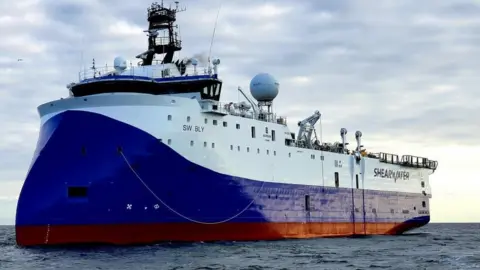Copeland: Controversial seismic sea tests off Cumbria coast complete
 BBC
BBCAn investigation to discover whether geology under the Irish Sea off Cumbria is suitable for an underground nuclear waste facility has now ended.
Seismic testing was being carried out Shearwater GeoServices, despite a petition by campaigners claiming it would be harmful to wildlife.
The area, off Copeland, is among those mooted as a possibility for a Geological Disposal Facility (GDF).
Analysis of the findings will now be carried out over the next 18 months.
Radioactive Waste Management is searching nationwide for a suitable site to store higher level radioactive waste, and an underground facility is thought to be the most safe and secure way.
'Necessary permissions'
The survey involved a 92m ship emitting sonic waves, but campaigners from Radiation Free Lakeland claimed the "seismic blasting" would be harmful to wildlife.
Recently they claimed sightings of porpoises close to shore were a sign the marine animals were trying to avoid the ship, the Local Democracy Reporting Service said.
Following the completion of the seismic testing, Mid Copeland GDF Community Partnership said it would analyse the data and "the conclusions will be shared with communities to support discussions about the potential of an area to host a GDF".
"For the survey, this included securing all the necessary permissions," it added.
"As best practice and also to comply with the permissions, a team of specialist observers were on-board the SW Bly and kept 24/7 observations from the bridge of the vessel for any mammals and birds.
"There were no safety or environmental incidents, and all mammal sightings were reported back to the Marine Management Organisation."

Follow BBC North East & Cumbria on Twitter, Facebook and Instagram. Send your story ideas to [email protected].
